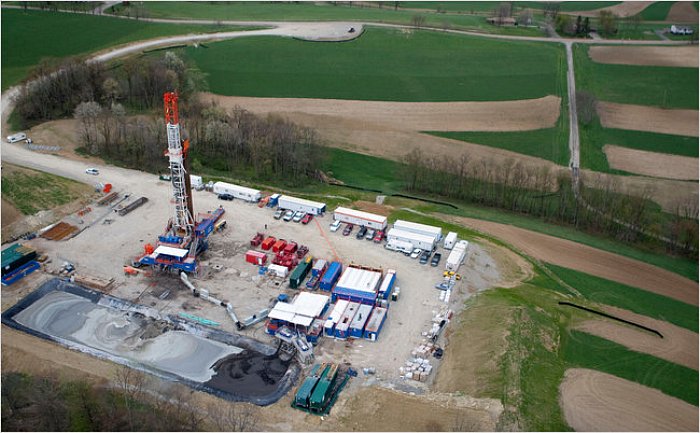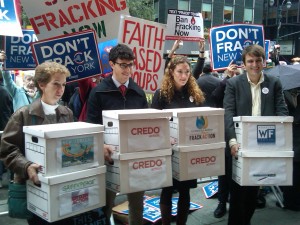Get the frack out of here

When I open up my electric and natural gas bills or have to fill my gas tank, I mutter a group of not-so-nice four letter words. Living is expensive, and it doesn't seem to be getting any cheaper. Horizontal hydraulic fracturing has helped to significantly decrease the cost of natural gas, but while we're saving a little money, the long term impact could be staggering.
I’m all for keeping my bills low, but not at the cost of people and the planet’s health.
What is horizontal hydraulic fracturing?
Vertical hydraulic fracturing or fracking has been around for about 40 years, but the horizontal variety has only been used for about the last four years. A pipe drills down into the ground and high pressure water, sand and other chemicals are injected into the ground in an effort to break through shale and other deposits to release the natural gasses trapped inside into a well.
Vertical fracking only drills down, but in horizontal fracking, a pipe drills down to a certain depth and then another pipe drills horizontally to get to difficult to reach deposits. For many years, fracking wasn't a financially viable option. It was simply too expensive to do. As the price of oil skyrocketed and the knowledge that untold amounts of natural gas deposits were waiting in shale, fracking had its chance to save the world, but at what consequences?
Benefits of fracking
My natural gas has bill has never been lower and during this cold winter, that was a financial life saver. The economy has been in a downturn for years and yet everything just keeps getting more expensive. Fracking was going to give us the break we've all been looking for. By tapping into previously unusable deposits of oil and natural gas, the U.S. has decreased its dependency on foreign oil and increased its energy security. We know have a ready supply should there be any kind of dramatic change in the global power structure.
The cities and towns where fracking is happening are getting increased taxes and people are being hired for good high-paying jobs. The owners of the land are being compensated for its use by the fracking companies. It’s a boon to the local economy through the use of local restaurants to feed the workers, hotels to house them, engineering, construction, etc.
There is no doubt that economically, fracking is a boon to everyone. Benefits to the people are in the form of lower bills and jobs and the government in the form of more taxes.

The problems of fracking
The main problems of fracking all stem from the high pressure fracking solution used. Millions of gallons of water and chemicals are injected into the soil. It begs the questions, what does it do and where does it go?
On a structural level, there is worry about microquakes and sinkholes created by the movement of the ground and the removal of the gas. We've seen how deadly a sinkhole can be recently, but this worry pales in comparison to the health risks.
Companies are doing their best to get as much of the liquid as possible, but they can’t get all of it. The water can seep for miles underground eventually making it to aquifers and groundwater. It pollutes rivers and lakes, water supplies and making people sick. Some of the chemicals involved are known carcinogens and people in these areas are drinking it.
All that chemically treated water is creating millions of gallons of toxic waste that must be disposed of, but is it? It’s not being treated, but pumped underground. The Pacific Institute released a report on the wastewater issues of fracking and include worries not only about health and safety, but the impact on agriculture as well.
There are countless studies showing the negative impacts of fracking.
Your money or your life
The state of Vermont, France and Bulgaria along with more than 250 communities have banned the use of fracking. Banning the use of fracking in the United States would likely lead to high natural gas prices again and the increased importation of foreign oil.
There will be an economic loss to the communities, but the health of the people in those communities can be improved. I’ll tell you a little secret about large corporations like those ran by fracking companies: They don’t care about you. They’d let an entire village get cancer if it meant their stock options would go up a few cents.
These companies won’t clean up their act until they are made to and the federal government is looking the other way. Perhaps they think it’s for the greater good or they want plausible deniability, so it’s up to the states and the communities to take a stand and tell these companies to get the frack out of there.
Main photo courtesy of inspirationgreen.com
Inset photo courtesy of foodandwaterwatch.org
2 comments